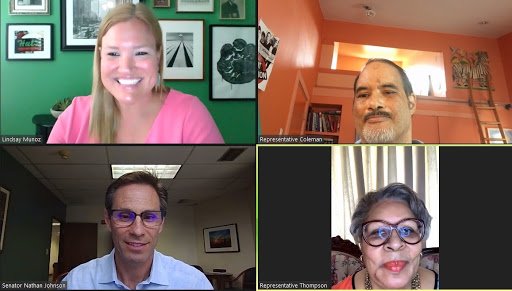Work, visits to the doctor, ordering from a restaurant – so much has gone virtual.
Hunger, however, has not. And right now more Texans than ever need help feeding their families. The North Texas Food Bank is answering the call, and they need our help to provide nutritious foods to those in need. Please consider participating in our Virtual Food Drive. You can order from their wish list (at this link) and it will be shipped directly to NTFB. For those who’d like to coordinate an in-person food donation, please email my office at District16.Johnson@senate.texas.gov.
Stay well, and remember,
In and around the District, virtually, in June:
In response to the recent surge in COVID-19 cases in Texas and Dallas County, Fox News (no, really) asked me (seriously) to appear live to discuss Texas’s pandemic response. Catch my remarks here.
The North Texas LGBT Chamber of Commerce hosted me and my colleague, Rep. Julie Johnson, at their annual Diversity, Equality, and Inclusion Conference for a discussion of our expectations and goals regarding individual rights and equal protection under the law.
Blood supply in North Texas is critically low. Thanks to many wonderful folks in and around my district, we had a successful blood donation drive. My sincere appreciation to those who participated. I have to say it’s a funny feeling to catch up with friends in a trailer while wearing masks and watching blood flow out of a tube in your arm, but it’s a good feeling.
Back at the Office
More than 500 constituents called or wrote to us in June, voicing concerns and seeking information about the reopening of schools, masks, the closing of bars (again), driver’s license renewal, professional licenses, unemployment benefits, and other matters related to public policy and practical life in the midst of a pandemic. If you need assistance relating to COVID-19, you can find a Resource Guide on my website.
Policy talk
I’ve resumed policy meetings, albeit virtually. The Greater Houston Partnership brought me in from out of town ($0 airfare!) to talk with Representatives Garnet Coleman and Senfronia Thompson about the cost of healthcare. I also met with the Interim Director of the Health and Human Services Commission (one of the state agencies charged with managing the statewide response to the coronavirus), discussed school reopening plans and state education policy initiatives with local school board members, and joined other legislators for numerous policy conferences with agencies, county and city governments, and school superintendents.
Policy Spotlight: A Practical Policy Nudge from the U.S. Supreme Court
We often think about U.S. Supreme Court decisions in terms of how they affect individual rights, or business rights, or both. But this month’s policy spotlight shines on how the Court’s recent decision in Bostock v. Clayton County may affect the fate of certain bills in the Texas Legislature next session.
In a 6-3 opinion, the Supreme Court held that the federal ban on employment discrimination “because of … sex” (under Title VII of the Civil Rights Act of 1964) covers discrimination on the basis of sexual orientation. The logic is pretty clear: if you can’t fire a man for being attracted to women, then you can’t fire a woman for being attracted to women; because the only difference in the latter scenario is that the person in question is a woman instead of a man. That’s discrimination “because of” a person’s sex. “Sex”, says Justice Gorsuch, writing for the majority, “plays a necessary and undisguisable role in the decision, exactly what Title VII forbids.”
The decision has great importance to individuals, of course. But it also has interesting and perhaps important implications for the Texas Legislature. Every session, a bill is filed to impose a statewide ban on discrimination based on sexual orientation. Every session, it goes nowhere. Although the Bostock decision renders such a bill unnecessary in the employment context, what about other contexts? Might the reasoning in Bostock be applied to state and federal laws that ban sexual discrimination in areas like housing, access to credit, and insurance?
The resulting uncertainty means that if we don’t pass a statewide discrimination ban, a number of lawsuits may be filed. A statewide ban could, perhaps, prevent litigation while also providing consistency in state law.
Those opposed to passage of a statewide discrimination ban have expressed concern that such laws invite litigation. The thing is, in practice they don’t. Many local governments have had nondiscrimination ordinances in place for years, without ensuing litigation.
Second, many feel that nondiscrimination laws may threaten their religious freedom. Here we run into the question: at what point does “religious freedom” – which we rightly cherish and enshrine – become “freedom to discriminate” – which we rightly abhor and condemn? It can be a difficult question. But we’re capable of crafting legislation that accommodates the distinction, if not perfectly, at least well enough to take us in the right direction.
Could this be the session in which the Legislature passes a statewide ban on discrimination based on the trait of sexual orientation? The Bostock decision provides a new practical context for the discussion.



